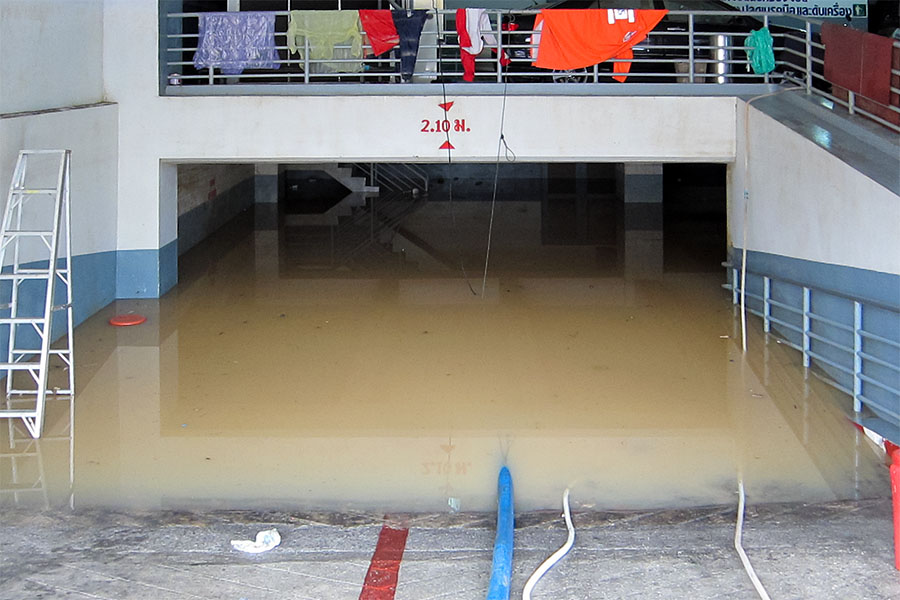Living In Thailand Blog
Saturday 15th November 2014
Can you think of a possible explanation? I can't.
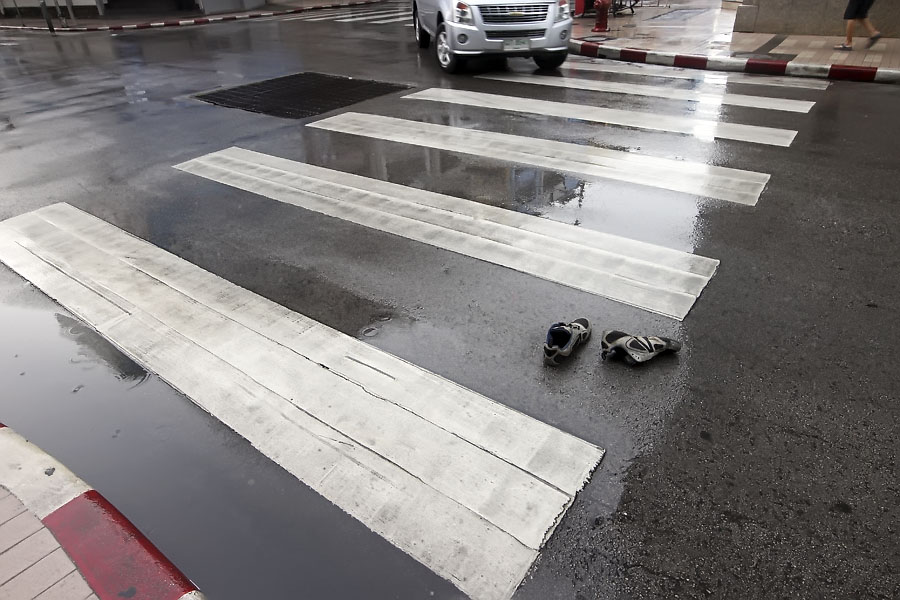
Abandoned shoes
Our friends returned from Phuket today, having been involved in a serious car accident last week. They had been going around a bend in wet conditions and lost control. They went off the road and hit a tree. Of course, the accident happened because the road was slippery, not because they were going far too fast.
The minivan driver that ploughed into the back of a truck recently, killing one of his passengers in the process, accepted no blame. According to him, it was the fault of the truck driver in front who had stopped to do a U-turn. It wasn't his fault for driving too fast and not leaving enough braking distance.
Accidents caused by excessive speed in Thailand are never the fault of the driver who is driving excessively quickly. The blame is always apportioned elsewhere.
As I have said many times, there are a multitude of reasons why the driving in Thailand is so dangerous, but this macho attitude is part of the problem.
Many Thai men have a highly over-inflated opinion of themselves and their abilities, and they can never do any wrong. They are all born racing drivers and accidents never occur because of their own incompetence. When reading about road accidents in Thailand, the drivers will often claim that the brakes failed or that there was some other kind of mechanical failure.
Of course, if they won't accept that they have done any wrong, there won't be any reason to change their ways. And thus the problem is self-perpetuating.
It's such a shame. Living in Thailand involves lots of minor irritations, but I can live with them. If a Thai tells me how well I can speak Thai and five minutes later I talk to another Thai who gives me a blank look as if I am speaking Martian, it irritates me but it isn't life threatening.
Unfortunately, the driving standards in Thailand are life threatening. It's insane on two counts. It's insane that Thais drive like they do in the first place, and it's insane that the government and law enforcement agencies do so little to prevent the carnage.
The government also needs to do some other things. Firstly, it needs to raise public awareness of the danger of driving at high speed and emphasise this during driver education.
Secondly, advertisers and manufacturers should be prevented from glamorising speed when selling vehicles. TV adverts for new vehicles, even pickup trucks, regular show the vehicles being driven at high speed by glamorous models and a recent advert for a Toyota Corolla model actually showed the car being driven around a race track.
This happened years ago with cigarette advertising. At one point, smoking was advertised as being glamorous and sexy. Now, cigarettes for sale at 7-Elevens in Thailand are hidden away from view and printed on the boxes are pictures of diseased internal organs.
The problem is that what 'should' happen in Thailand very rarely happens. I recently started to re-read John Laird's 'Money Politics, Globalisation and Crisis - The Case of Thailand'.
It's an excellent book, full of very accurate observation and excellent analysis. It was published in 2000 and many of the problems that the author highlights still exist. The author also makes a lot of suggestions about actions that Thailand 'should' take, but Thais are Thais and they always do things their own way.
Thursday 13th November 2014
My day started at 6am with high drama and my wife in floods of tears.
The friends that we went to Penang with a few weeks ago went to Phuket on Saturday for a weekend break to celebrate their daughter's first birthday. I don't speak to them everyday or keep track of their whereabouts, but my wife does. She talks to the girl in person every day, or uses the Line application on her phone that many Thais use.
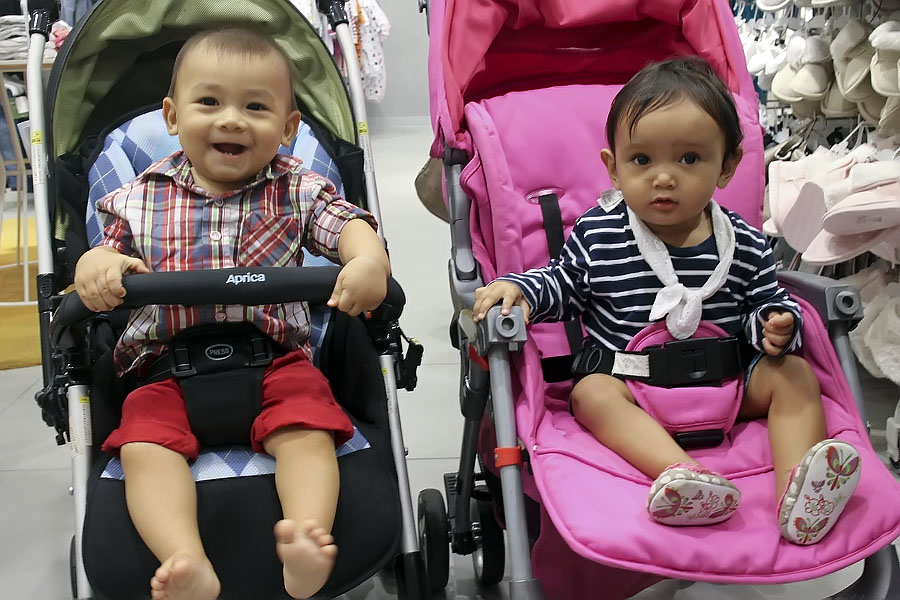
Our son and our friends' daughter in Penang last month
The little girl is lucky to still be with us
She was getting worried because they haven't returned yet and she didn't know why. They are very busy running their own graphic design business from home and can't afford to have long breaks. We found out this morning that they had a serious road accident on Saturday on the way to Phuket.
Their car looks to be totalled, but the good news is that no one was killed or seriously injured. They still haven't returned home. The girl told my wife they are in a hotel, but we think they are in hospital and don't want their friends or relatives to worry. Although they have told us about the accident, we have a feeling that they aren't telling us everything.
Their car hit a tree and rolled several times. Fortunately, they were all wearing seat belts and the child was strapped into a car seat. My wife said that they don't usually bother with seat belts. This is the case for many Thais and it is rare for child seats to be fitted for small children and babies. Babies and small children normally sit on the passenger's lap in the front of the car and no one wears a belt.
I wanted to know more about the accident. The storm that missed us didn't miss Phuket and there was a lot of rain there over the weekend. No other cars were involved and their car (a Chevrolet Captiva SUV) is almost new with good tyres. I can only conclude that the accident was caused by excessive speed on a slippery road and that the driver lost control.
Big trees aren't very forgiving and my wife told me this morning that drivers who hit and damage trees in Thailand have to pay the government for the damage to the tree.
Our friends drive very fast. On a couple of occasions the girl has gone screaming past me on the main road in front of our development. A few months ago I mentioned this to her. She gave me a wry grin and told me that her husband drives even faster. She seemed quite proud.
I mentioned it not to compliment her high speed driving ability, but to try to tell her in a gentle way that she was driving too fast, especially with a young baby on board, and should slow down. There are many, many reasons for the excessive road accident rate in Thailand, but high speed driving is a major cause.
Obviously, she didn't realise I was trying to give her advice, or she realised but didn't pay any attention because she didn't believe that driving fast was dangerous.
They are now having nightmares about what happened and I suspect that the nightmares will continue for a long time to come. The thing that will disturb them most is not what actually happened, but what could have happened. Fortunately, all three survived.
I have written repeatedly about the problems on Thailand's roads and how fast Thais drive. They can drive like this for a long time and not have a problem, but eventually their luck will run out. At some stage another vehicle will pull out unexpectedly or they will hit a slippery patch of road.
They ignore government warnings about excessive speed and pay no attention to speed limits. The only thing that makes them slow down is being involved in a serious accident in which someone could have died. It's tragic. Virtually every Thai in the country has a relative or close friend who was killed in a road accident.
As I said the other day, every cloud has a silver lining and after this incident I expect they will finally slow down a little.
For a couple of years we drove to Phuket at Christmas to spend time with my brother. We haven't been the last couple of years because of the children, but in a way I am quite pleased. It's quite a scary journey.
I have been driving for 36 years and I'm a confident driver. However, in Thailand the biggest danger comes from other road users. On the way to Phuket there are a lot of single lane roads and Thais want to overtake all the time. Thais are forever overtaking and as you drive you see vehicles coming straight at you on your side of the road as they overtake in the other direction.
They drive at crazy speeds, there are lots of big trucks and buses driving at high speed, and around Christmas time there can be a lot of rain. When it rains, Thais don't slow down. They drive just as fast and when it gets really dark in a storm many don't turn on their headlights. Their behaviour is incredibly stupid and as a result lots of accidents occur.
Some dashcam footage shot in a pickup truck and shown on Thai TV news a couple of weeks ago illustrated another major problem on Thai roads - that of the childish mentality of many Thai males.
A guy in a pickup truck was driving along and in the car was his wife and child. As usual, the child was on its mother's lap in the front of the car and no one was wearing a seatbelt.
As he was driving along another pickup truck overtook him at very high speed. When this happens to me (as it often does) I just saying, "****ing idiot," and let him go. Many Thai males don't do this.
To them, having been overtaken by someone else constitutes a loss of face and they feel an obligation to respond. Instead of just letting the idiot go, Somchai puts his accelerator to the floor and starts to give chase.
The two trucks end up racing along the fast lane at (I would estimate) in excess of 120kmh. On the video you can hear the guy's wife frantically telling him to stop because she is scared, but he just ignores her.
As they are racing along you can see a big truck ahead in the slow lane. The truck overtakes a slower vehicle and probably doesn't realise how fast the trucks are going. With a big truck now in their path the first truck has to brake heavily and goes into a sideways slide.
The second truck then collides with the first truck and they both end up in a ditch. You can hear the guy's wife and child crying in the background.
I need to install a dashcam in my car because some of the things I see are truly unbelievable. I can write descriptions here, but it doesn't compare to watching a real video and seeing how the idiots behave. Roads in Thailand are extremely dangerous places because of the way in which many Thais drive.
Not only is the behaviour of Thai drivers crazy, but there is virtually no enforcement of traffic laws and the condition of some vehicles represents a serious hazard. Trucks are seriously overloaded and people drive around with no tread on their tyres. It's a nightmare.
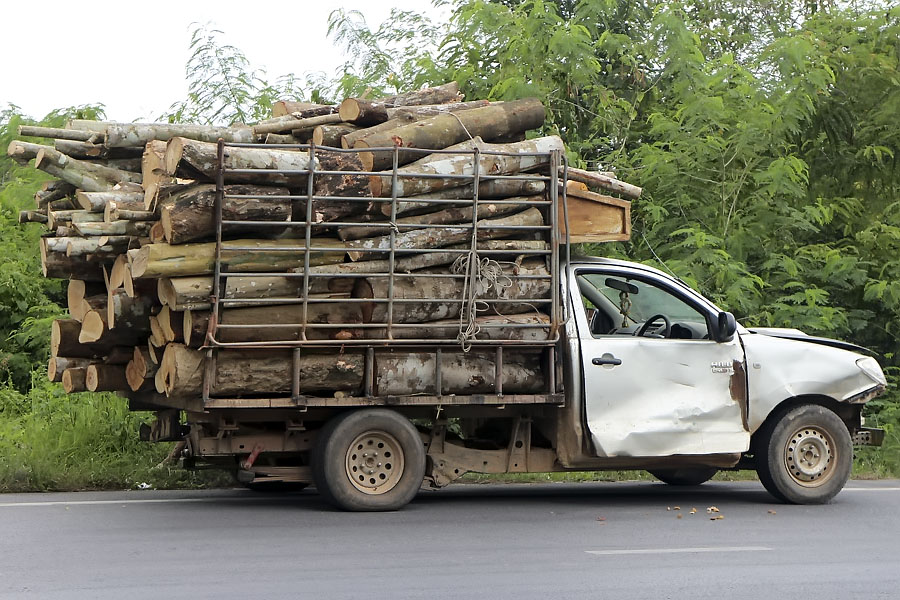
Overloaded truck
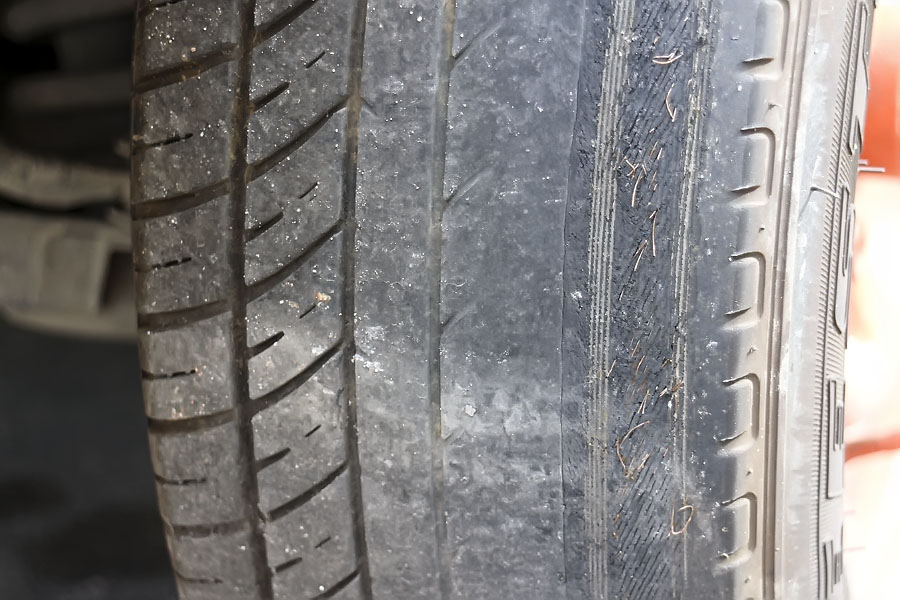
Bald tyre
Driving vehicles in this condition in other countries would be regarded as a serious offense, but in Thailand nothing happens.
Wednesday 12th November 2014
There was a big news story in Thailand recently about a Thai woman who murdered her Japanese husband. She had a Thai boyfriend, who had butchery skills, and they cut the body up and dumped it in a canal.
This was the woman's second Japanese husband. The first died in an 'accident' when he fell down the stairs. After the second husband's demise, the case concerning the first husband was reopened because it probably wasn't an accident after all.
Her motive for the murders was money. The foreign husbands had life policies and in both cases she profited.
A few years ago a Canadian oil worker working and living Thailand was murdered by his Thai wife and her Thai boyfriend. He too had a big life insurance policy and even though he treated his wife very well, he was worth more to her dead than alive. I wouldn't describe this kind of thing as common in Thailand, but it isn't unknown.
An enormous amount of money is made illegally in Thailand and in some cases where good politicians have tried to end illegal activity they have been gunned down by hired thugs.
At the same time bad politicians have implemented various policies, the main motive of which is to enrich themselves, with no concern about the economic damage they do to the country.
On a personal level, I have had my share of problems over the years with greedy Thais who seem to think that all foreigners are massively wealthy and that they have a right to rip off foreigners.
Having lived in Thailand for a number of years and seen what unbridled greed and lust for money does to people, I have come to dislike money. However, I can't live how I want to without the stuff and need it to maintain a satisfactory lifestyle for me and my family. I regard it as a necessary evil.
Many foreigners - myself included - become enchanted with Thailand on vacations and some - like myself - make plans to go to live in the Kingdom. Inevitably, the question of how much money is necessary comes up quite often.
As far as I am concerned it is one of those, "How long is a piece of string?" questions. It's completely personal and it is an impossible question for someone else to answer. Despite this, I still see people trying to answer it on their blogs. The answer may be fine for them, but it depends on a individual's personal situation and expectations.
I have met people living in Thailand and the only income they have is a UK state pension - about Bt25,000 per month. They survive. The going rate for a foreign teacher teaching English in the provinces is about Bt30,000. It's more in Bangkok and teachers can do tutoring to increase their incomes. They survive.
Therefore, if asked the question, "How much is needed to live in Thailand?" I could say Bt25,000 per month and I wouldn't necessarily be wrong. But neither would I be right.
My brother works in Singapore as a foreign exchange dealer for a big international bank. He earns megabucks and flies home to Phuket every weekend. He owns a six-bedroom villa in Phuket with a large pool, two new cars, a speedboat, and sends his daughter to an excellent international school. A maid comes in every day to do the housework and people come in to maintain the garden and pool. He likes to eat at the best restaurants and fine dining isn't cheap in Phuket. With so many rich foreigners there, Phuket is the most expensive place in Thailand.
I don't know how much his outgoings are, but if I told him that all he needed to live in Thailand was Bt25,000 a month he would laugh. Do you see what I mean?
I've seen rooms to rent for Bt1,500 per month. You can still buy rice-based meals for Bt30 and if you really wanted to save money you could go to the local university where food is subsidised for students, but the canteen is open to everyone. Water is cheap and you could live this way for Bt5,000 per month.
At the other end of the scale you could rent a huge villa in Phuket or a penthouse apartment in Bangkok and it would set you back hundreds of thousands of Baht each month - just for accommodation.
Thailand has a lot of poor people and it can be a cheap place to live, but the best of everything is also available ... at a very high price. Those expensive German luxury cars that you see rich Thais driving around in cost more than three times the amount they cost in Europe.
The bottom line is that if you live alone you can choose how much to spend and it is fairly easy to control. Realistically, the minimum amount is probably around 30k in the provinces and 40k in Bangkok. There is no upper limit.
As a single man I very rarely spent more than my income and money was easy to control. The problems come when other people enter the equation.
It gets lonely living alone and it is no secret that many foreign men go to Thailand with the intention of finding a wife or girlfriend. Many of the women have children already from previous relationships and, if they don't, they will want kids. I have never met a Thai female who didn't want children. This is when the spending starts to go crazy.
In addition to having to support other people, Thais have certain expectations when they get involved with foreigners. After all, all foreigners - without exception - are hugely rich. With kids come medical bills, the need for larger accommodation, and the need for cars, etc.
Whereas poor Thais have no option other than public hospitals, they choose private hospitals if a farang is paying the bill. Medical bills are comparatively cheap in Thailand, but they can still be expensive.
Medical insurance may or may not help. Since having insurance I think that my medical bills have only exceeded the premium in one year. I still want the insurance, just in case. This year I bought insurance for myself, my wife and two kids, but I dropped OPD insurance because it was too expensive.
Some Thai girls also have an expectation that their foreign husband will also support their extended family. I'm fortunate not to have this problem, but it exists, especially with the Isaan girls - and many foreign men have a tendency to get involved with Isaan girls rather than Thai girls from elsewhere.
My parents didn't have to pay any school fees when I was young, but I have to in Thailand. It's not that expensive - about Bt11,000 per term - and there are two terms. A fancy international school has just opened nearby and it costs over Bt200,000 per terms. There are three terms. There are also additional costs and the total gets close to Bt1 million per year.
Food isn't too expensive if you want to eat like locals, but after 11 years of eating rice and noodles I am sick of Thai food. The little treats from home that are available in branches of TOPS are very expensive. In fact, everything that is imported is expensive.
Everything regarded as essential by the Thai government is available in Thailand, and everything that comes in from abroad is regarded as a luxury. All luxuries are hit with a big luxury tax. This includes cars that aren't assembled in Thailand, and even the parts for those cars. This is why the fuel pump I had replaced cost Bt20,000, when I can buy a similar one for Bt3,000 on eBay.
Talking of eBay, a toy for daughter just arrived from Germany. It will be one of her Christmas presents and I ordered it from Germany because I couldn't find one anywhere in Thailand. The postage charge was quite expensive and when it arrived in Thailand the Thai government valued it at Bt5,000 and made me pay Bt1,420 tax.
If you want to eat Bt30 rice or noodles, that is possible. The best Western restaurant where I live is run by a German guy and he does an excellent job, but if you want a pork knuckle dinner and a few beers it will cost Bt1,000. If you want the best foreign food in Bangkok you can pay significantly more.
What about transport? A Thai family of five can get around on a 125cc Honda Wave and old, used bikes can be bought for Bt5,000. After the used car market collapsed last year a decent used car can now be bought for Bt300,000. If you have Bt20 million spare, you can buy a new Ferrari.
There is always public transport, but it can be uncomfortable, inconvenient and dangerous. It is also getting more expensive.
Rented rooms can be had for Bt1,500, but most Westerners wouldn't feel comfortable in such places. Where I live there are some nice rooms for Bt6,500 - Bt10,000.
Townhouses can be rented for Bt5,000 per month, but they are often in bad areas where there are problems with Thais from low socioeconomic classes and also flooding problems. Our old rented house felt like living on a racing track with motorbikes and pickup trucks racing around constantly. The area was also filthy.
A friend rents a very nice, large Chinese house for Bt16,000 (after bargaining down from about Bt25,000). I don't know of any houses like mine for rent, but there is currently a smaller version for rent for about Bt50,000 a month.
So far, I have only covered the essentials, but of course we all need other things otherwise we would get bored. The recent trip to Malaysia was because my wife was bored and I treat myself to things occasionally.
There is little direct taxation in Thailand, such as rates or poll tax. You are therefore not obliged to pay for something just because you are in Thailand. It's up to you.
I should also add that if you intend staying in Thailand on either a retirement or marriage visa, you will need to show money in the bank or proof of an income every time your visa needs renewing. The amounts are Bt800,000 and Bt400,000 respectively.
If you are a single man and have no wish to get involved in a relationship, but want to enjoy the gentlemanly pleasures that are widely available in Thailand, that also doesn't come cheap these days. I have seen a few complaints on-line about how expensive these services are becoming in Thailand.
Please don't ask me about costs, because these days I don't have much of a clue. I accidentally went into a short-time brothel recently after mistaking it for a hotel. The sign outside indicated that it was a hotel. Thirty minute sessions with some dodgy looking girls were Bt500. Other places have really attractive girls that you can spend all night with, but the cost is probably upwards of Bt5,000.
Having written this, I still don't really feel I have answered the question, but that is because (as I said above) it is really an impossible question to answer.
I just received an e-mail asking if it is possible to live on Bt45,000 per month. For me, it isn't, and my brother wouldn't even last a week on this amount of money. However, a retiree on a state pension or a teacher earning Bt30,000 would welcome this amount as a significant increase.
I'm not you, I don't know anything about your personal situation or expectations, and therefore I can't give you an answer. I only know about me. Since I have been married, the minimum monthly amount is about Bt60,000 and some months are double this.
If you rent or buy a house in Thailand it will come with very little. My house and also my rented house were completely bare when we moved in. Landlords aren't generally interested and if you want something, you must pay for it. In the rented house I paid for curtains, burglar bars, mosquito screens, new interior paint, extra power points, kitchen counters, and other additions. After I bought this house I paid about half a million for curtains, furniture, air-conditioners, and other things.
The cost of new houses has risen significantly in the last few years. A few years ago it was possible to buy a townhouse for Bt800,000 and I used to see cars parked outside houses where the car cost more than the house. Those places are now being sold closer to Bt3 million.
On the development where I live the smallest houses (every house is detached) used to start at just over Bt3 million. They are now upwards of Bt5 million. It also depends where you live in Thailand. Bangkok is expensive for property and I live in one of the most expensive provinces. If you live in the remote north or northeast it is a lot cheaper. If you want to live in one of the well known tourist resorts with a view of the sea it will be very expensive.
Thai law prevents foreigners from owning land in Thailand. That also means houses because houses need land to stand on, but not condos, which don't. There are various ways that foreigners can purchase land in Thailand, but they are all risky.
Thailand used to be a cheap country and that reputation still exists with many foreigners. It can be, but it can also be very expensive.
Personally, I have no wish to live the same way as many Thais because I simply wouldn't feel comfortable. I want to live a Western lifestyle in a safe, comfortable house in a peaceful neighbourhood without any lo-so Thais racing around the streets. I refuse to put my children's lives at risk by transporting them on motorbikes, which means having a car. Our choice of location in which to live actually means having two cars.
The health of my family is important, which means good food and good healthcare. I can't afford to send my kids to international schools, but I want them to go to decent private schools.
I have lost my desire to travel, but my wife still expects to see different places. Neither of us drink or smoke. I like to buy camera equipment and books occasionally and she likes iPads and mobile phones, but we aren't extravagant or materialistic. The kids need educational equipment and toys.
The person who sent me an e-mail was reluctant to ask because it was a personal question. However, I write this for those interested in living in Thailand, not for tourists, and costs are an important issue. That's why I am quite open about it, but I can only speak for me because I'm not you.
If you have any specific questions about costs, by all means ask me and I will try to give you an answer as best I can.
Monday 10th November 2014
I heard today that the staff at my daughter's school removed computer equipment and paperwork a few days ago and stored it on the third floor in readiness for the big storm that never arrived.
The school was hit hard in the big 2010 flood (I was working there at the time) and they are now very nervous. The 2010 flood is still fresh in people's minds and now there is a palpable anxiousness in the air whenever the risk of more flooding arises.
During the rainy season a year after the big flood, while we were still living in a major flood zone, I moved our possessions upstairs and downstairs about three times. It was hard work and no fun at all. This is no way to live, but it is the reality of life for many Thais.
The big 2010 flood was my first first-hand experience of flooding and it was quite a traumatic event. Fortunately, I had no kids, cats or car at the time, which made life easier, but it was still very unpleasant.
Despite this, there was one good thing to come out of the experience.
As soon as we had recovered I resolved to move house and wanted to live somewhere that wasn't prone to flooding. My previous plan had been to stay in the rented house for about five years before buying somewhere.
The flood forced me to act immediately and within a few months I had put down a deposit on a house. This turned out to be a good thing because house prices had already started to rise very quickly and this trend was to continue. I was told by a neighbour that six months before I put down my deposit the house was Bt500,000 cheaper. A year later, the price had risen by Bt1.5 million
There are times when I have a tendency to procrastinate, especially when thinking about making large purchases, but procrastination often leads to problems.
So, every cloud has a silver lining.
Everyone here seems very surprised that the storm didn't arrive. A few years ago one of the big criticisms was that people weren't warned sufficiently of impending bad weather.
That situation has improved immensely. The flood warning flags are now maintained properly and the local municipality runs a website which has links to webcams, satellite images, weather maps, etc. Information is also broadcast on local radio.
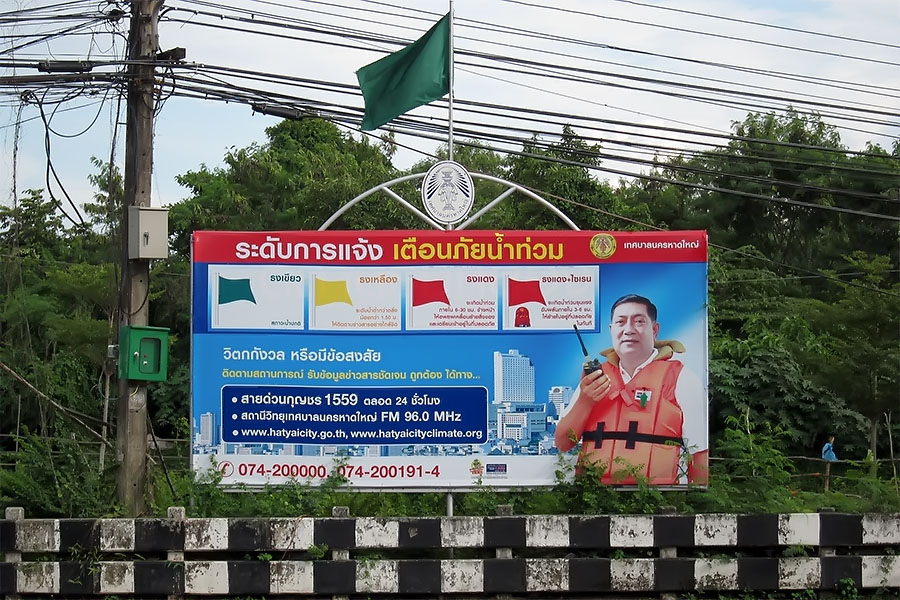
The 'problem' now (it's not really a problem) is that when the Meteorological Department and local authorities issue stern warnings that a storm is coming, as they did a few days ago, then locals really do expect a big storm to arrive.
Of course, weather is highly unpredictable and sometimes storms change their course. Anyway, the threat is now over for the time being.
When it's not actually raining, the rainy season in deep southern Thailand (October to December) is the best time of the year because it's not oppressively hot, as it is for nine months of the year. My room thermometer is reading a balmy 28°C at the moment and it feels very pleasant. For once, it doesn't feel like living in a sauna.
Another article about the complete and utter farce of university education in the Third World.
The students who feel they have the right to cheat
Sunday 9th November 2014
Where did the storm go? After writing yesterday, not much happened weatherwise. If anything, it brightened up a little and there was less rain.
Makro was packed with people stocking up on supplies and some of the conversations I overheard confirmed that people were buying food and water in anticipation of a big storm, or even flooding.
Darkness fell and still the storm hadn't arrived. A neighbour told me very convincingly that it would arrive between 4-5 a.m. on Sunday morning. Radar and satellite imagery combined with lots of computing power mean that meteorological departments can predict the arrival of storms quite accurately.
Before going to bed I did some final checks outside to ensure that everything was prepared for the worst. I went to sleep expecting to be woken up in the early hours by the sound of fierce winds and lashing rain. It didn't happen.
The night was still with just a little rain and this morning the sun even dared to show its face. I actually feel a little disappointed; deflated, even.
This year has been one endless round of looking after a new baby, taking care of a three year-old, washing dishes and doing laundry. It has been real drudgery. We have zero opportunity of doing anything fun or exciting at the moment and the prospect of a big storm was going to be the most exciting event of the year.
And then it didn't arrive. It petered out like a Thai student's enthusiasm for learning English with a new foreign teacher after the second lesson.
Other areas caught some wet weather, but this part of southern Thailand missed everything.
Heavy rains pound Nakhon Si Thammarat, Pattani
Saturday 8th November 2014
The rain arrived some time in the early hours of this morning. It's neither heavy nor light, but it beats down with an unrelenting persistency. The skies are heavy and grey from horizon to horizon and there is no sign of it letting up. It will only get heavier in the next 24 hours.
My duvet slipped off last night and it felt like being in the Arctic. The temperature this morning is a bone-chilling 26.2°C. At this rate, the local municipality will soon be sending out emergency blankets and cold weather gear.
The plan today is to buy food, water and other supplies. We will then batten down the hatches and aim to stay inside as much as possible until the storm passes. The Thai Meteorological Department predicts that this will happen on Monday.
Friday 7th November 2014
Flooding here can be caused by excessive rainfall over a prolonged period of time, or by the sudden arrival of a big storm.
As I said the other day, there hasn't been a huge amount of rainfall so far this rainy season and I don't think there will be. However, my wife saw on the news today that Songkhla is about to be hit by a big storm on the 9th.
Any Malaysian or Singaporean tourists planning to visit Hat Yai in the next few days should be aware of this weather warning.
There is a bit of an oil industry in Songkhla province and the boyfriend of one of my wife's friends works offshore. Word is that the big oil companies have already pulled their workers off the rigs in the Gulf of Thailand.
I had a quick glance at the Nation and Bangkok Post, but couldn't find any weather warnings. The only place I could find anything is on the 'Warning News' page of the Thai Meteorological Department website.
"During 8-10 November the low pressure cell over lower South China Sea located at the east of Songkhla about 600 kilometers will move to the lower Southern part of Thailand. More rain with gust and isolated heavy to very heavy rain are expected over the lower Chumphon. People should beware of heavy and accumulate rain in the both side of the lower Chumphon. Wind-wave in the Gulf will stronger with wave high 2-4 meters. All ship in the Gulf should proceed with caution and small boat keep ashore in this period."
This is certainly not a good time to be taking the ferry to Samui or Koh Tao.
If we were still living in the rented house I would now be extremely worried. But I'm not, and big storms no longer worry me particularly. We haven't had a real severe weather test yet, but the house should be fine and any structural damage should be covered by our house insurance policy.
Even so, we still need to get some emergency supplies in and check that flashlight batteries are OK. There was quite a long power outage yesterday and if any flooding occurs there will be more power cuts. Flooding in other areas can also make it difficult to buy supplies if shops are closed or roads are impassable.
We have a 1,500 litre water tank, but if there is no electricity we won't be able to pump water into the house. HomePro has a good selection of generators and having a generator to run the water pump, and maybe some emergency lighting, might be a good idea. It's something I need to think about.
After the power cut yesterday I was reminded what an excellent investment it was buying an Uninterruptible Power Supply (UPS) for my computer. We don't get that many long power outages, but short blips of a few seconds occur all the time.
I hear the UPS relays kicking in quite often and every time this happens it means that my computer stays up and my work is saved instead of losing everything. Lots of power cuts could also destroy a computer's hard drive.
Laptops with working batteries already have a built-in UPS, but if you use a desktop computer in Thailand it very worthwhile investing in an external UPS.
Update: A warning has now appeared on the Bangkok Post website. It says that Surat Thani and Nakhon Si Thammarat provinces will be hit hardest, but that heavy rain will affect the whole of the southern region.
Two southern provinces on alert for heavy rain
There has been no rain so far, but it has been dark and foreboding all day today without even the tiniest glimpse of blue sky or sunshine. The palms outside my office window are completely motionless. It's the classic 'calm before the storm'. The next couple of days should be fun.
Thursday 6th November 2014
It's Loy Gratong. This festival doesn't fall on a fixed date, but is determined by the lunar calendar. It has come early this year.
I made an effort to attend when I first arrived in Thailand, but now I feel the same way about it as I felt about Guy Fawkes' Night in the UK, which was yesterday. If it's convenient I will go, however, it doesn't bother me if I don't go. I've seen it several times before and this year won't be any different.
With two very young kids it is difficult to go anywhere these days, therefore, I suspect that we won't be floating our gratongs this evening. On the other hand, the wife may have other ideas.
Gratongs are small baskets that were traditionally made from banana leaves. A few years ago they started being made from styrofoam, but this was very bad for the environment. Sometimes they are made from bread and this way the fish get a free meal.
Some Thais make their own, but most buy a ready-made gratong. On Loy Gratong Day there are many vendors selling gratongs. The tradition is to put a nail clipping and a small lock of hair into the gratong, along with a small coin, candle and incense stick.
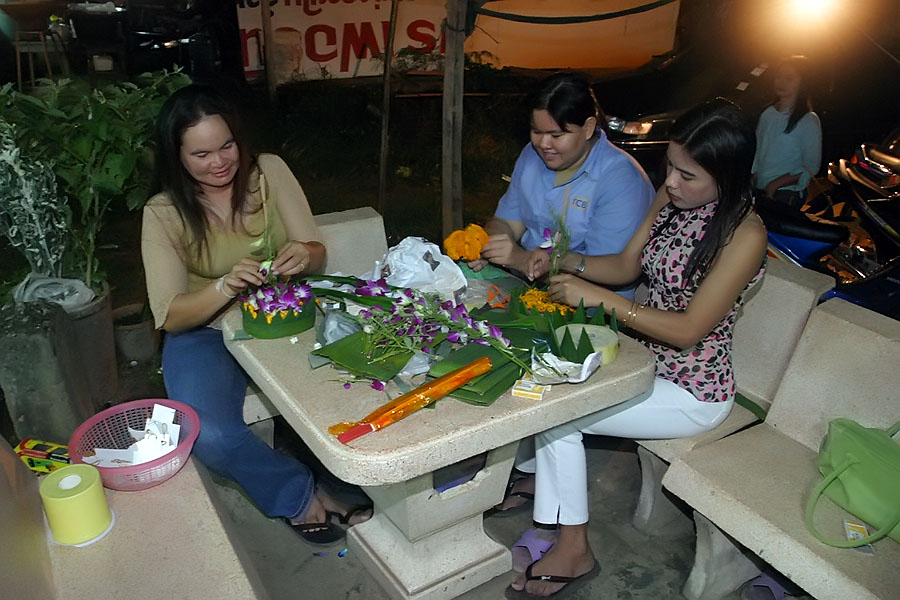
The gratong is floated (loy is the Thai verb 'to float') on a body of water somewhere. Thais believe that the gratong will carry away sins and bad luck. At some places you will see lots of young urchins in the filthy water retrieving the coins.
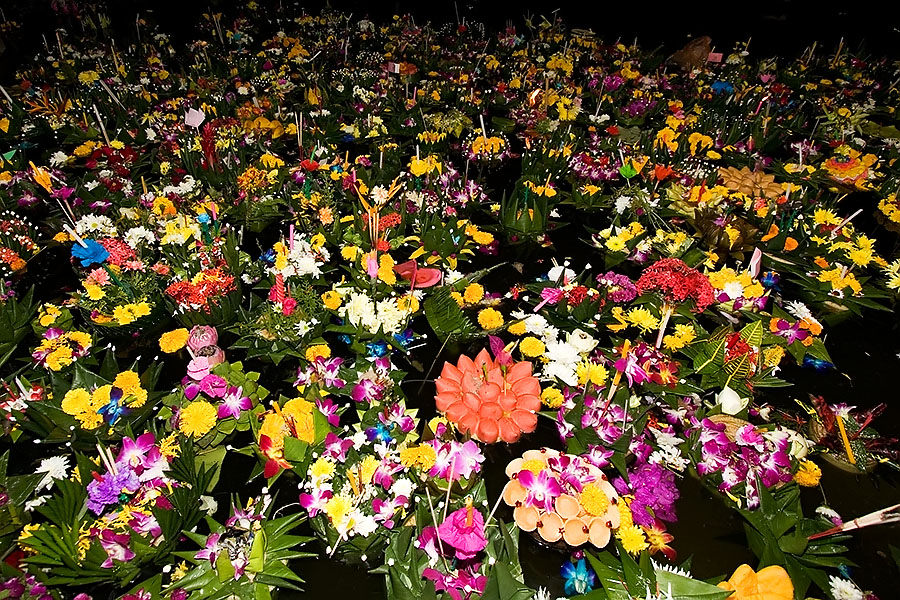
Physical beauty is highly prized in Thailand and Political Correctness never arrived in the country (thankfully), therefore, there are lots of beauty contests. There is a special beauty contest on Loy Gratong Day known as 'Naang Noppamaat' and this is a very good day in Thailand - probably the best day of the year - to see Thai feminine beauty.
This is when the genuinely beautiful Thai girls put themselves on display in various parades around the country. A Loy Gratong parade is held at the local university and some of the girls are stunning.


The best place to experience Loy Gratong, apparently, is Sukothai. I have visited Sukothai, but not at Loy Gratong. However, I can imagine that against the backdrop of all the ancient temples it is very special.

If you haven't been before, it is certainly worth attending this festival. It is gentle and far more civilised than the aquatic anarchy that takes place every April during Songkran.
It's a bit of a generalisation, but many Thais do not like rules, laws or regulations. The only thing they dislike more than rules, laws and regulations is somebody telling them they can't do something because of a rule, law or regulation. This makes them furious because they seem to think that they have a right to do whatever they want.
On Thai roads I can do anything. I can drive as fast as I like, as recklessly as I like, and as lawlessly as I like. Unless I cause an accident, nothing is likely to happen. The police have no interest in idiots on the road and other drivers won't do anything.
However, the one thing I can't do is to say anything to other drivers who are driving dangerously or recklessly. If I do I will get the usual threats of violence or death. This isn't an exaggeration. In the past one guy turned into hand into the shape of a gun and indicated he wanted to shoot me and another ran his finger across his throat.
Another example of this mentality has just surfaced online.
Airlines have very clear policies about the size and weight of carry-on hand luggage. On recent trips to Bangkok I have seen people board the flight with enormous hand luggage because they don't want to wait at the carousel for checked baggage. Some airlines are quite lax about enforcing regulations.
Budget airline tend to be quite strict, not least because they charge for baggage that is bigger or heavier than they allow. Regardless, of their reasons for doing so, they have a right to make sure that passengers comply with their regulations.
This Thai guy didn't comply with the regulations and then acted in typical fashion when the air hostess told him that his luggage had to be checked. I suspect that he is probably a pickup truck owner.
Instead of just complying, he argued and then threw his luggage on the runway in a fit or rage. The other passengers had started to get upset because he was delaying the flight.
AirAsia defends crew in baggage row
Good for AirAsia. They should indeed defend their crew, and they should give the girl who had to deal with this arrogant idiot a big bonus.
Tuesday 4th November 2014
The Swiss and Germans are known for their precision. In Thailand it is exactly the opposite and I find it very difficult most of the time to get precise (or even close) answers to my questions.
There is a word in Thai that is used a lot to deliberately avoid any degree of accuracy:
กว่า (gwaa)
This word gwaa can be used as a comparative in Thai, the same as the 'er' suffix in English - for example, yai-gwaa = bigger. That's fine. But there is another common usage.
If I ask how much something costs and hear, "meun gwaa", I know that the price is more than Bt10,000, but less than Bt20,000. 'More than Bt10,000' can be Bt10,001 or Bt19,999. This answer isn't particularly useful.
If I ask a worker what time of day he will arrive at my house to do a job he may tell me, "Tee-ung gwaa," which means 'after midday'. How much after midday? I don't know, but experience tells me that it will probably be several hours after midday.
I need a haircut at the moment and after taking my daughter to school early this morning I went to my favourite barber shop. I had never been there early before and wasn't sure what time it opened. It was closed.
I asked a woman who lived nearby. She wasn't sure so told me, "bpairt mong gwaa," - after 8am. Oh no, not the dreaded 'gwaa' answer. How much after 8am? 8:05, 8:30, 8:59? I didn't know. I waited until about 8:45 and there was still no sign of it opening so I went home and I still need a haircut.
As far as Thais are concerned, replying with 'gwaa' is a perfectly satisfactory answer, but if you ask a question and receive an answer with 'gwaa' it actually means nothing.
I have seen signs advertising houses for sale that use the word 'gwaa' in the price and this is about as useful as the following photo. Is the 'special price' for this two-storey town house with three bedrooms and three bathrooms Bt2,000,001 or Bt2,999,999?

From personal experience, if Thais are being vague about something it is usually to try to give them an advantage. The owner of the house in the sign wants prospective buyers to think that the house costs around Bt2 million, whereas the price is more likely to be quite a lot higher. When 'gwaa' is used with time, it normally means a long time after the stated time.
Of course, this works both ways and my official age in Thailand is now saam-sip-gwaa - over 30. It's complete rubbish, but by saying this to Thais I'm not actually lying. When in Rome ...
Monday 3rd November 2014
"When in Rome ..." so the saying goes. It's easy to say, but difficult - and in many cases, impossible - to do.
I can eat with a spoon and fork, rather than a knife and fork. I can wai, rather than shaking hands when I meet someone. When the need arises I can clean my backside with a squirty gun, rather than with paper.
What I can't do is unlearn behaviour that I was taught from a very young age, or change my core beliefs and values.
One of my core values is fairness. I played cricket for many years and playing fairly in the spirit of the game is much more important than winning. This is why Englishman get so upset with countries whose cricketers are found guilty of ball tampering. I was taught to wait in line, taught to take my turn, and taught that people who arrive first get served first.
I was also taught to be polite. In addition, I found out that being impolite was not acceptable in the society I was brought up in. People didn't march into pubs and shout their orders at the barman. They waited politely until they were asked what they would like.
This innate sense of fairness even extended to declining to be served if I was aware that someone else had been waiting longer than I, but hadn't been noticed by the server.
In Thailand it is all very different.
This morning I went to buy my wife some boiled rice from a street vendor and it was the usual story. As I was waiting to be served, several people came up behind me and just shouted their orders straight at the vendor.
All Thais do this and many are not the kind of people you would normally think of as being rude or impolite. It's just the way they are and they think nothing of it. Even when I have been standing in what is obviously a queue, people just go straight to the front to get served. It's as if they don't notice people around them.
As I have made clear, I get extremely annoyed at Thai drivers and sometimes this happens before I have even got on to the main road.
The exit from my housing development is quite wide and normally I want to turn right. It's a very busy road and sometimes I have to wait several minutes before I can turn.
If another driver wants to do the same thing, instead of waiting behind me he will pull up alongside me so that he can get out before me. By doing so he obstructs my vision and I have to wait even longer before I can pull out. This kind of behaviour makes me froth at the mouth, but it happens so often that Thais obviously think it is acceptable.
Apart from the dangerous way in which Thais drive, it is this kind of selfishness that really irritates me. Many Thai drivers never want to wait in a line of traffic, but will find ways to get to the head of the queue first, such as using the hard shoulder as an undertaking lane.
In this region this kind of thing doesn't happen only in Thailand. In Penang recently I was waiting to order an omelette in the hotel restaurant and the same thing happened.
Singapore is the only developed country in the region, but if you ever use the Mass Rapid Transport (MRT) system there you will find the same thing. The platform has markings to indicate where the doors of the train are. People make sure they will be in front of a door when the train arrives and then barge their way on to get a seat. Singaporeans are generally quite polite, but the Kiasu culture dictates how many Singaporeans behave.
The concept of queueing isn't unknown in Thailand. At post offices, certain government buildings and some private service companies it is necessary to first obtain a numbered ticket and people have to wait until their number is called before they are served.
However, unless it is forced upon them, people don't generally show any sense of fairness and it resorts to the usual 'me first' behaviour.
If you were brought up with better manners you may find this behaviour distasteful, but - as is the case with many things in Thailand - you can't change anything. When in Rome you have to accept what the Romans do.
Despite my reservations about the Thai education system, I have quite a lot of respect for many individual Thai teachers. They work hard and get paid very little. Ther system may be flawed, but they try their best.
My wife worked as a teacher. Her starting pay at a private school with a good reputation was about Bt7,000 a month (roughly 214 USD). Every year her pay went up by Bt200 per month (about 6USD).
She was an art teacher and whenever the school organised activities she had to paint signs and do other artwork. It was a Catholic school and at Christmas she had to paint festive scenes, etc. She did all this extra work in her own time and wasn't paid for it. Thai teachers do a lot of other jobs in addition to teaching and don't get paid. As a farang teacher teaching at a Thai school I never had to do these things.
I arrived at the school early today to pick up my daughter and observed her teacher for a while through the window. It made me feel tired just watching her.
Teaching very young children needs certain skills and it also requires huge amounts of physical and mental energy. The kids get bored very quickly and need to be kept active all the time. It's a tough job and I would imagine that teachers of young children go home feeling exhausted.
The class has about 30 kids, which is too many for one teacher. There is also an assistant in the classroom, who I believe is newly qualified and is doing the job to get experience. I have been told that she receives no salary or expenses. It actually costs her money to work because she has food and travelling expenses. She works just as hard as the main teacher and arrives at work even earlier than the main teacher.
The salary that Thai teachers earn isn't enough to live on and for this reason most of them do private tutoring in the evenings and at weekends. A teacher I used to know earned Bt9,000 from her job at the school and about Bt21,000 from tutoring. This meant working every hour she could without getting a day off, but the Bt30,000 she earned was enough to live on.
In the part of provincial Thailand where I live the standard salary for a farang teacher is Bt30,000 (salaries are higher in Bangkok, but so are living costs). Compared to Western countries, this is a pittance, but it's a lot more than Thai teachers earn.
One of my wife's old colleagues left and went to work at another school, where she earned Bt15,000 a month (460 USD). Her old friends thought this was a huge salary. Bt15,000 a month was also the figure that Yingluck's government promised Thai graduates. Again, in the West this would be considered a pittance, but Thais think that it is quite a high salary. I don't know how many manage to live.
A friend of a friend who lives in England (and has just acquired a British passport) was back in Thailand recently and visited me last week. She has been in England for a long time and has no plans to return. She actually remarked how expensive food is in Thailand.
The monthly allowance that I give my wife is meant to cover food, electricity, and what is left over is hers. Just recently, she has run out of money for food by about the end of the third week. This didn't use to be the case.
We have no debts to service and no extravagant tastes to cater for, but last month was another Bt100,000 month. The trip to Penang (including mny wife's watch) cost about Bt30,000. My car developed a problem and I was hit with a Bt20,000 repair bill and in addition I had to pay Bt11,000 to renew my car insurance.
I gave my wife her usual allowance, but then had to give her more and there were the usual 'extra' costs that come each month and soon start to add up. For the first time in ages I actually treated myself and bought a new camera lens, which cost about Bt13,000.
Thailand continues to get more expensive all the time and the only thing that doesn't go up is wages. This hurts you if you work in Thailand and a low exchange rate (compared to a few years ago) hurts you if your income is from abroad. Thailand is certainly not the cheap place it once was.
Sunday 2nd November 2014
What do you do with millions of extra graduates?
This story is about India and China, but Thailand is exactly the same. It's as if developing countries have a point to prove and want to show that they are as good as Western countries based on how many graduates they can churn out each year. One problem is that many of the graduates lack any real practical skills, and another is that no one knows what to do with them. All that has happened is that the minimum qualification for any kind of job has been raised to a Bachelor's degree.
The following is a job advert from a hotel in Krabi where I stayed a few years ago:
Title: Assistant Executive Housekeeping
Responsibilities: To take care general preparation of the guest rooms such as cleaning of check-in and check-out room. Standard set up of rooming items and cleaning off other areas on the guest floors including staircases, corridors, pantry rooms. To assure that all hotel linen is properly handled, and guest laundry is to be treated accurately subject to hotel policies.
Qualifications required: Bachelor's Degree in related field.
It's an impressive title, but to me this job description sounds like a room maid. Does a room maid really need to have a Bachelor's degree, and would a person of genuine graduate ability be applying for a job as a room maid? Every job advertised in Thailand asks for a Bachelor's degree.
It also means that intelligent foreigners in Thailand with lots of real world business experience, but without degrees, are deemed unemployable in Thailand. I find the whole thing a complete joke.
Two cultural traits can be seen here. Firstly, the inability to think about the future in order to ascertain which skills will be needed in coming years and secondly, always putting image ahead of substance.
Countries such as South Korea and Singapore didn't simply decide to produce hundreds of thousands of graduates each year without any real purpose. These countries are always looking ahead to predict futures trends and then investing in infrastructure and real skills so that they can stay ahead.
The world changes very quickly these days. Old skills become obsolete very quickly and new skills need to be developed very quickly. Until such time as Thais acquire a completely different mindset, nothing will change in the country.
All that is happening in Thailand is that the problem is being exacerbated. Thai graduates nowadays know that having a Bachelor's degree doesn't give them much of an advantage, so more and more are doing Master's degrees. Meanwhile, many Thai universities have issued a directive that all lecturers should have a Doctorate degree. Consequently, many are now doing PhD's.
Despite the fact that Thailand will soon become the most qualified nation in the world (on paper), none of this actually addresses the real issue. It's simply a case of being off course already and going further down the wrong path.
University education serves a very important purpose, but it is now the wrong way round. When I left school there were many jobs on offer with the world's biggest and best companies and applicants only needed four 'O' levels to be considered.
University degrees were needed for certain professions in which people needed a lot of academic knowledge. People studied for a degree if they wanted to do a certain profession, and they studied hard.
Nowadays, with a growing world population, the emergence of the Third World, and increased manufacturing efficiency which means far less jobs, people study for degrees to demonstrate that they have attained a tertiary level of education without having a particular job in mind.
This demand for degrees that don't lead to specific types of work has resulted in all sorts of Mickey Mouse degrees being offered just so that people without any great academic skills can study for degrees.
This may have seemed like a great idea a few years ago, but the cracks are already showing and the system will need to be changed soon.
Saturday 1st November 2014
November 2014 has started grey and drizzly. It is cooler than usual, but it is never really cool here and the thermometer in my room is currently registering 29.2°C.
There was some heavy rain in October at the start of the month, but nothing very persistent after that. One big storm caused a flash flood in an area where I used to rent a house, but the risk of flooding this year looks to be low.
It was all very different four years ago. October 2010 had been exceptionally wet and it seemed that whenever one storm passed, another came in to replace it immediately. On the night of 1st November 2010 I went to bed and when I awoke a few hours later there was a two meter flood in the downstairs of our rented house.
Just behind my floating fridge in the photo below is the door to the toilet, which was completely submerged by the flood water.

When I looked into it previously, there was a correlation between big floods in the area where I live (2000 and 2010) and intense La Niña conditions. La Niña appears to be quiet at the moment, therefore I don't think there will be a problem this year.
One of my old students visited me a few months ago at my new house (which isn't in an area prone to flooding) and I was explaining that one of the reasons I moved was because of flooding. She was surprised. She told me that flooding was perfectly normal. My view is somewhat different. I've heard this kind of thing from other Thais and I've also been told that floods are fun. For people whose lives are really boring and who have nothing to lose when flooding arrives, I guess they are.
It was a most unpleasant experience to live through and in addition it was inconvenient and expensive. The clean up afterwards took a long time and the damage to my property cost at least Bt30,000. We received Bt5,000 in compensation from the local municipality. Insurance companies in Thailand will not insure properties against floods if the properties are in areas prone to flooding. They are not stupid.
Lots of cars were submerged in the flood and subsequently repaired. I would imagine that cars repaired after flood damage suffer from a lot of intermittent electrical problems, as well as the problem of rusting from the inside out. If buying a used car in Thailand it is worth checking for flood damage along with all the other checks that you would normally do on a used car.
